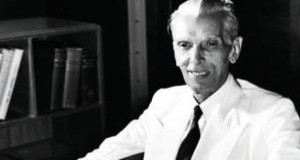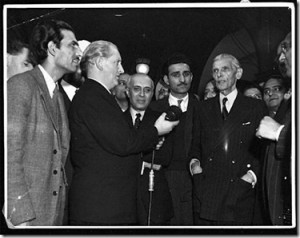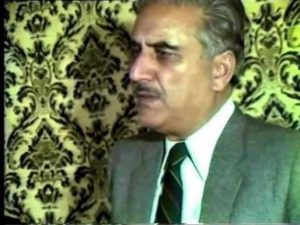Peace Watch » Editor's Take, Kashmir-Talk » K. H. Khurshid: Student Private Secretary of Jinnah Khurshid
K. H. Khurshid: Student Private Secretary of Jinnah Khurshid
Remembering K. H. Khurshid
Z.G. MUHAMMAD
It is unimaginable. It sounds like a fairy tale. Nevertheless, it is a true story; history had cast role for a young student leader from Srinagar in contributing his mite in ‘altering the course of history, modifying the map of the world and creating a nation state.’ The twenty-year-old student leader who earned distinction of joining the team of Muhammad Ali Jinnah, a man of ‘sartorial elegance’ and ‘indomitable will’ – who occupies a place of ‘primacy’ in South Asian history, was Khurshid Hassan…remembered as K.H. Khurshid. 
In 1942, a student organization, the Jammu and Kashmir Muslim Students Federation was born in Srinagar to further the cause of the freedom. In a short span of time, it established its units in all colleges of both the provinces- Jammu and Kashmir. Ahmed-ullah Rani was elected as President and Khurshid Hassan as General Secretary of this organization. Our chronicles have recorded names of many members of this organization. Some years back, I had an opportunity of interacting with some members of this student organization.
‘In May 1944, when Quaid-e-Azam Muhammad Ali Jinnah was in Srinagar besides addressing massive public meetings he also addressed members of the Muslim Student Federation. On this occasion, Khurshid Hassan presented a memorandum on behalf of the students of Jammu and Kashmir. However, it was not his first meeting with the Muslim League leader. Talking about his first meeting with M.A. Jinnah Khurshid writes in his book Memories of Jinnah, “I met him for the first time on 19 November 1942, at Jullandhar, where Punjab Muslim Students Federation was holding its annual conference.’ He along with another student leader Ghulam Rasool had been selected by the Union to represent it at Jullandhar. “When I say I met Jinnah for the first time, I do not mean there was a meeting as such” writes Khurshid, “It would be more appropriate to say I saw him and we shook hands. He just uttered one sentence’ ‘So this yours, as he handed me the Muslim League flag which had been awarded to our Union for unrolling the largest number of members.” Second time, Khurshid saw Jinnah in Lahore where he had been sent college principal M.D. Taseer to take part in ‘declamation’ i.e. oratory contest. From that day, the young Kashmiri student followed activities of Quaid in press religiously as he writes, ‘from that day he became firm believer in Jinnah’.
In 1944, Jinnah stayed for about two months in Srinagar. It was longest stay of any All India leader in Srinagar. He met scores of delegations from all classes of society- leaders of political parties and students. Garden parities were organized and dinners hosted for him by rich and influential people. Khurshid writes, ‘His secretary Lobo – a Christen from Goa introduced me to Jinnah not only as a student worker but also as correspondent of the orient press, the only Muslim news agency in India.’ 
Khurshid’s book edited by Khalid Hassan and published posthumously by Sang-e- Meel publications; Lahore gives many details about M.A. Jinnah’s activities in Kashmir which none of his important biographers have done earlier. This book for the first time tells us about Liaqute Ali Khan’s visit to Srinagar when Jinnah was here. The author of the book met Liaqute Ali for the first time on the bund, when he was strolling with Quaid and Fatima Jinnah. The book provides an insight into the working of the Muslim Conference and the National Conference during stay of Jinnah in Srinagar that had far-reaching impact on future developments in the state. Divided Kashmir leadership had pained Jinnah. He made a brief appeal to them for unity. It was on this occasion he ‘made the much-to-be quoted statement, ‘we have one God, one Quran, One Kaba, and one Prophet. Let us have one, organization, one platform, one flag and one leader’.
The book is an important addition to the history of sub-continent. Perhaps no other person other than could have had more intimate knowledge of the development during last phase of India’s freedom as Khurshid had. He provides us ‘a rare glimpse of aspects of the Quaid-e-Azam’s character and personality.’ Sharing his personal experiences, the author has demolished the image ‘of the cold blooded schemer as projected by fictionalized film of Richard Attenborough’s Gandhi and some Indian and European authors.’
He was considerate even to young Kashmir students and heard them patiently. Khurshid writes, ‘He behaved towards me exquisitely. Later, as my visits frequented, he would often come to door himself to let me in.’ One, is here reminded of Frank Morass’s experience with Quaid-e-Azam, “ I had heard tales of his rudeness, but over fifteen years, I was to know him’ he was never anything but considerate, often kind.’ He was incredibly straightforward, brutally frank and did not believe in honey-tongued diplomacy. He undoubtedly was a disciplinarian Khurshid writes, ‘but his manner was paternal.’ How much concerned he felt about Khurshid becomes evident from the notes of Hector Bolitho first biographer of Jinnah, edited by Sharif Mujahid and published by Oxford. Khurshid told him, ‘I was staying with Jinnah in Cowasjee Jehangir’s country house. Jinnah worried lest I was bored. He asked do you read Shakespeare. ‘I confessed not since school.’ He went into town and brought back a whole set of Shakespeare, Shelly and Keats for me to read.’ (page 86)
This Srinagar boy born in 1924, earned perhaps the best ever kudos from founder of Pakistan than any other of the Muslim League leaders. When Jinnah was asked who created Pakistan he said, “I will tell you who made Pakistan. Myself, my secretary and his typewriter.’ Nevertheless, K.H. Khurshid could not attend millions of mourners when the great leader died. In October, the Jinnah had sent him to visit his family in Srinagar. Sheikh Abdullah, who had been appointed by GOI India as Chief Administrator put him in jail- where he was still in jail Jinnah passed away in Karachi….
Filed under: Editor's Take, Kashmir-Talk · Tags: Jinnah, K. H. Khurshid, Z. G. muhammad








